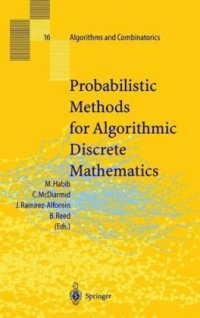
Ebook: Probabilistic Methods for Algorithmic Discrete Mathematics
Author: Michael Molloy (auth.) Michel Habib Colin McDiarmid Jorge Ramirez-Alfonsin Bruce Reed (eds.)
- Tags: Combinatorics, Computation by Abstract Devices, Symbolic and Algebraic Manipulation, Probability Theory and Stochastic Processes
- Series: Algorithms and Combinatorics 16
- Year: 1998
- Publisher: Springer-Verlag Berlin Heidelberg
- Edition: 1
- Language: English
- djvu
The book gives an accessible account of modern pro- babilistic methods for analyzing combinatorial structures and algorithms. Each topic is approached in a didactic manner but the most recent developments are linked to the basic ma- terial. Extensive lists of references and a detailed index will make this a useful guide for graduate students and researchers. Special features included:
- a simple treatment of Talagrand inequalities and their applications
- an overview and many carefully worked out examples of the probabilistic analysis of combinatorial algorithms
- a discussion of the "exact simulation" algorithm (in the context of Markov Chain Monte Carlo Methods)
- a general method for finding asymptotically optimal or near optimal graph colouring, showing how the probabilistic method may be fine-tuned to explit the structure of the underlying graph
- a succinct treatment of randomized algorithms and derandomization techniques
The book gives an accessible account of modern probabilistic methods for analyzing combinatorial structures and algorithms. It will be an useful guide for graduate students and researchers.Special features included: a simple treatment of Talagrand's inequalities and their applications; an overview and many carefully worked out examples of the probabilistic analysis of combinatorial algorithms; a discussion of the "exact simulation" algorithm (in the context of Markov Chain Monte Carlo Methods); a general method for finding asymptotically optimal or near optimal graph colouring, showing how the probabilistic method may be fine-tuned to exploit the structure of the underlying graph; a succinct treatment of randomized algorithms and derandomization techniques.